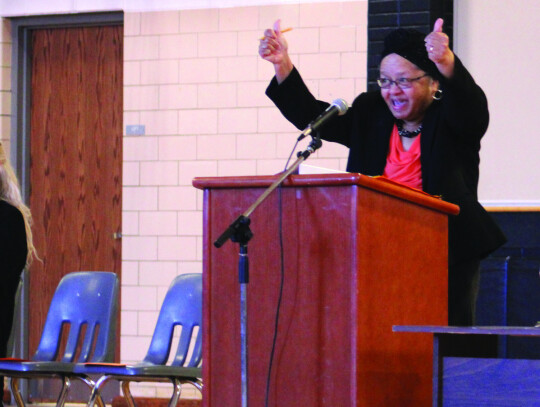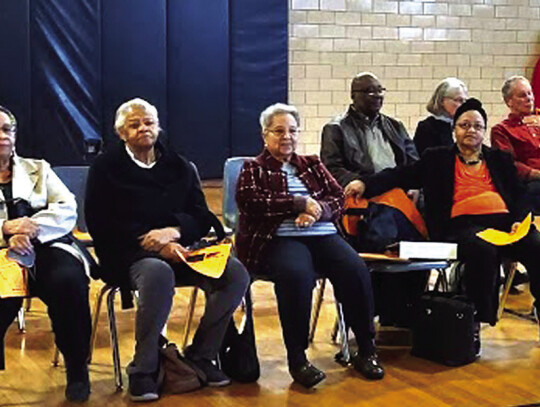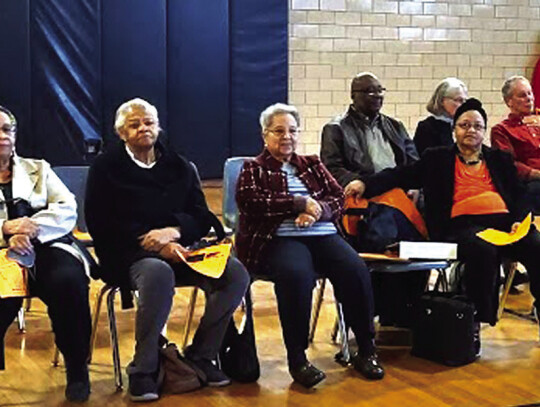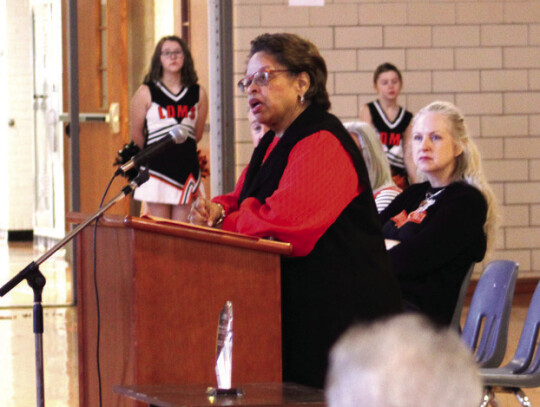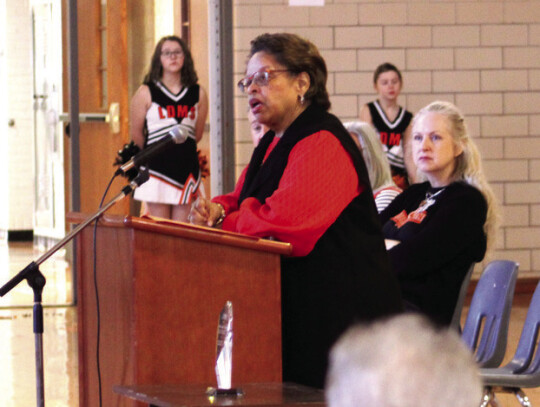An assembly with talks, music and school cheers helped students at Lylburn Downing Middle School better understand the long history of their school.
The event, held at the end of Black History Month, was called “School Spirit as School History: The Legacies of Lylburn Downing School.”
Lylburn Downing’s history reaches back to 1927 when it was founded as a school for Black students, providing first through ninth grade education for those from the city and the county.
The growth of the school was a community effort, as explained by Lexington Vice Mayor Marylin Evans Alexander, who attended Lylburn Downing before local schools were integrated in 1965.
“At that time, students had to move away from home to finish high school, because they couldn’t go beyond ninth grade here,” she said.
“To increase the number of grade levels beyond ninth grade, some of the parents put their money together to pay for an additional teacher. But then, as the years went by and more grades were added, they were eventually able to teach all area Black students, grades one through 12, Rockbridge County, Buena Vista and Lexington.” Along with the other area schools, Lylburn Downing was integrated 10 years after the Supreme Court’s Brown versus Board of Education ruling found segregation of schools unconstitutional.
Alexander, a middle school student at the time, has a personal memory of this historic event.
“When I came here in eighth grade, it was the first year of integration for the entire area, full integration. I think that turmoil was expected,” she recalled, “but it was very peaceful for students, the initial start of integration.”
Changes in the school system, though, did introduce challenges.
“The biggest difference for us was that most of the Black teachers were gone, the only teachers we ever knew. This was the only place that some of them had ever taught, and they lost their jobs here. They had to leave the area, some retired, and most left Virginia entirely.”
But Alexander understood the long-term results to be successful.
“Despite the struggles in the early years, the students thrived and they became successful in their careers,” she said. “Some became teachers, professors, doctors, dentists, nurses, government and military positions, business executives.”
Eric Wilson, executive director of the Rockbridge Historical Society and a faculty member in Lexington City Schools, spoke to the gathered students about the importance of understanding history, both personal and political.
He acknowledged Lexington as a place rooted in history.
“We are a town full of plaques and historical signs because we are a town of almost 250 years of Euro and African and Native American histories, of significant figures and events,” he said.
Lylburn Downing is a part of that history, as a recently installed state plaque acknowledges.
“Since last summer, many of you walk to school right past a big, white heavy metal sign right where the sidewalk ends,” Wilson said. “You have to turn to read it, but when you do, you see the building that houses your city’s community center, your school division central offices, and that was the original building of this city’s first Black high school.”
It is from this place the school as it stands today drew its name, its symbols, and important traditions.
As Wilson said, “The history of Lylburn Downing Middle School adds to and doesn’t erase that of Lylburn Downing High School that preceded it. That’s the school that gave you your school colors, gave you your school mascot, a Trojan, and even gave us the school song.”
Lylburn Liggins Downing, in whose honor the school was named, was born into slavery in 1862. He went on to earn a degree from Lincoln University and pastor a church in Roanoke for 40 years. He became a supporter of educational opportunities for Virginia’s Black students.
Along with Lexington City Schools Superintendent Rebecca Walters and LDMS Principal Abbott Keesee, Wilson encouraged the students not only to learn about their school’s history, but also to incorporate it into their lives.
“How do you get to school? Some of you walk, some of you drive, or drive to another school to get bussed here. That’s a practical, material question: ‘How’ do you get to school?” said Wilson. “But it’s also a broader question: How do ‘you’ get to school? You get here because of other people. You stand on their shoulders.”
The 2023 Trojans cheerleading squad showed just how that tradition is still building. Led by cheerleading coaches and LDMS alumnae Sekena Wilson and Mallory Douglas, they led the entire student body in cheers that had been drawn from archived “School Yells” from the 1950s and ‘60s.
Two former Downing cheerleaders from that era, Priscilla Baker and Danta Thompson Johnson, were actually on hand to cheer along as honored guests, shaking the black and orange pom-poms distributed to everyone attending, in colorful school spirit.
Former Downing student Rick Alexander, LDMS choir and band teacher Karen Doyle, and the LDMS student chorus similarly led the assembly in learning and singing the first verses and chorus of the historic Lylburn Downing School alma mater.
Wyllona Evans Harris, Downing High School class of 1961, reflected on her own experiences in the school’s band, with the teachers who inspired her to pursue a career in math and in teaching, and on the close relationships the school held throughout the Green Hill and Diamond Hill neighborhoods Her sister, Marylin Alexander, concluded by encouraging the students to think about the legacies they may leave.
“Since 1927, Lylburn Downing students have such a rich history, and for students here today, each of you will go out into great things too, because of the enriched foundations you received within these walls,” she said. “In 50 years, someone, maybe one of you, will come back, stand right here, and talk about your rich history here. But just don’t forget when it started, and how it started in 1927.”
Jason White, director of operations and student services for Lexington’s schools, also spoke about legacy, closing with a challenge to the current generation of students.
“We’ve reached the point in our program today where we say what is next — what is your legacy? Hopefully the program today has enriched your understanding and experience of this wonderful school and what it has meant in the lives of many others. But now, students, it’s your time. How will you carry this knowledge on in your life?” he asked.
“I challenge you to take this information and share it with others, parents, grandparents, siblings, friends alike. Shall we always remember to celebrate the history of this school and use it to better ourselves going forward.”


